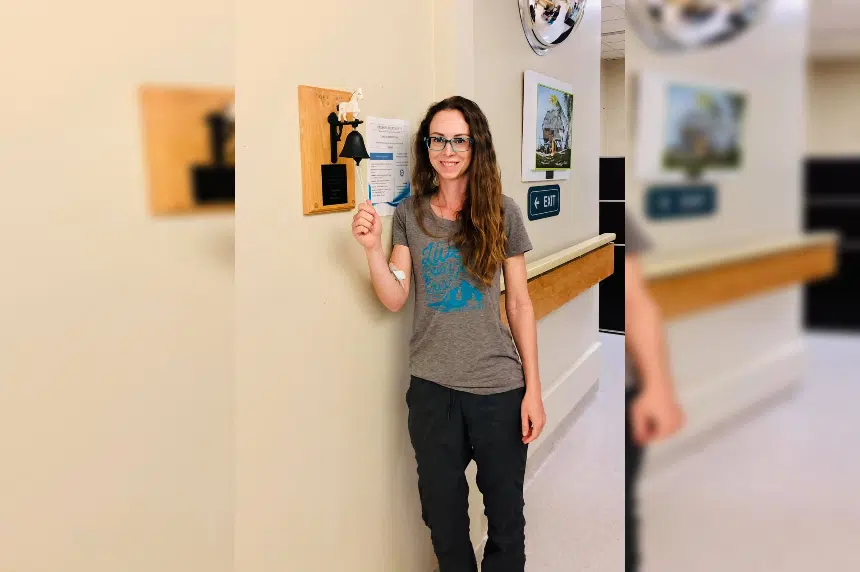Adelle Stewart is used to helping others with their struggles with mental health as the executive director of the Do More Ag Foundation.
But, in mid-April, her focus changed from others to her own silent battle.
She was diagnosed with cervical cancer.
“It was kind of right at the height of basically the world and Saskatchewan shutting down. Right from the onset, I went to everything alone,” Stewart said.
“I would go into (all) my diagnostics, my meetings with my oncologists, the treatments themselves — both chemo and radiation — all the first and all the continuations and all the tests (alone).”
Stewart said she had family or friends drop her off at the doors of the hospital or clinic, and that continued as the COVID-19 pandemic was unfolding in Saskatchewan.
“Basically, (I) did all this in the ghost towns of the hospitals,” she said.
Stewart kept her diagnosis quiet. She said her close friends and family knew, along with members of the foundation. But it wasn’t something she was comfortable talking about publicly, as she continued her treatments in Saskatoon.
“For anybody, it’s life-altering, the diagnosis of cancer and the fear that comes along with it. (I went) from being a very active person, living and managing a farm, (to) being blindsided with something that honestly actually left me bed-ridden for over six weeks all the way through treatment,” she said.
Stewart took on the responsibility of self-isolation by herself at home through treatments; the only person entering her home was her mother. She was also self-isolating, but she missed her normal life.
Stewart had to stay away from her friends and her family — especially the ones in health care.
She said she still tried to stay active on the farm but would be stuck in her bed for around 20 hours per day. During that time, she turned to TV, which also took an emotional toll on her with the diagnosis.
“They were surreal. (You) watch the TV shows, and someone is diagnosed with cancer (and) they just float in and out of your head. (When) it’s you, I felt this hypersensitivity,” she said. “It was really, really difficult.”
As the pandemic continued, there were a lot of people who didn’t know what tomorrow would bring — especially those who needed to use the health-care system. It created anxiety for Stewart every time her phone would ring.
“The screens that you go through, and the calls that you’d get, you’d see the prefix for the health region on your phone and you’d get anxiety just looking at it,” she said. “It was weird. The hospitals, they were a ghost town. They were fully staffed, but there was nobody in them.”
When she would first get to the hospital, Stewart remembers looking around the waiting room, knowing all those waiting were also going through the same journey as her.
“I would look at them, and just wonder what they’re going through at these times and how they’re coping. I work in mental health, and it took an incredibly emotional toll on me to stay on top of my mental wellness,” she said.
Stewart said she felt vulnerable with the diagnosis and had to go through a lot of emotions as the days carried on. Being the executive director of a mental health foundation linked to agriculture in Saskatchewan, she said she was blessed with the tools she had going in.
“I think I could have been in a very dark place, much darker place, especially with the stressors that COVID added on to the treatment process,” she said. “There was a time when I was nearing the end of treatment where I questioned to myself — I remember vividly — ‘(Am) I still this sick? Or is this what depression feels like?’ ”
After weeks of treatments, Stewart finally saw them near their end.
And, on July 10, she rang the end-of-treatment bell.
“It felt great (but) I still felt horrible. (It) was a relief. I call it more of a milestone … It was the celebration of a milestone in the entire journey that will be my recovery over the years,” she explained.
She isn’t done yet. She still has scans and appointments upcoming in the future, but Stewart said she feels great now and is doing all she can to stay healthy mentally and physically.
She said she does hope to integrate her story into her work with Do More Ag. A coping strategy she used through the treatment included journalling her experience.
That led to her finding her next project.
She recently received the ‘Author Launchpad’ scholarship, which will help her in self-publishing her first book.
She continues to blog about her experience, which can be found here.
“It’s been incredible. So many things have come together for me on that,” she said. “I’m really looking forward to sharing that with other people who may resonate with it.”







